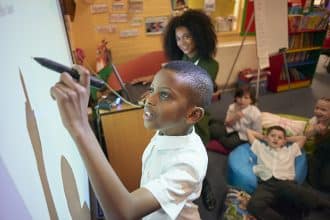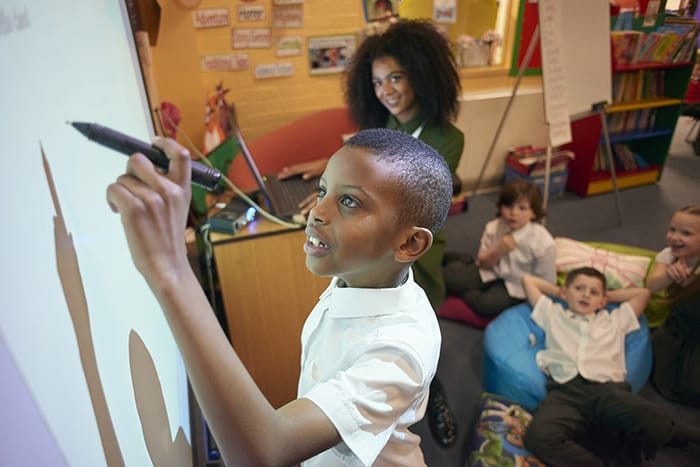
In fact, as a human race, if we get education right, then we will win… All of us.
According to the UN’s “The Millennium Development Goals Report ” the number of primary-school-aged children out of school has declined by 44% since 1990, driven in significant part by the strategy set in the Millennium Development Goals and global monitoring process coordinated by UNESCO. That means things are already moving in some form of direction. And hopefully, the correct one…
The key may be to incorporate creativity, innovation, play and technology within the education system – they are as important as numeracy and literacy. Paul Collard the UK education expert carried out extensive research in this area as has the LEGO foundation.
On a basic economic level if one uses the Obama maxim as a vision for education policy: “Out-educate today, out-compete tomorrow” – then if implemented well, it will result in a boost to GDP, a reduction in social tension and an increase in diverse thought. Globally.
In turn that means preserving the maximum number of the earth’s resources for future generations. And maximising on what we have. Perhaps, only that shared purpose will save humanity. Hanging onto that meaning in life signifies that other things like intolerance and aggression are less easy to grip and will slip out of people’s hands.
And if we get things really right then the societal definition of job and identity will change and those that spend their time helping the community will have equal status to those with commercial aims. In an ideal scenario, universal income and some kind of technology levy will pay for people to be retrained. Especially important since in the future workforce is likely to transition through an average of 5 to 7 professions throughout their working life.
Education should guarantee that humanity will be at the centre of human progress not technology. This in turn means that we will enter an age of purpose. The question is: can we as a race overcome the human tendency for self destruction and violence which is somehow deeply rooted in our DNA – the basis of our survival instinct perhaps?
But now for the ‘educator’s dilemma’. (Apologies to Clayten Christensen ), how much should we focus on technical skills versus social skills within the formal education system… ? And how to integrate the many informal education networks?
In my personal experience of working with the London Youth Arts Network in the early “noughties”, I know how important it was for young people just to be taken seriously and not patronised. When twenty years ago Sir Nicholas Serota very kindly provided the Crow’s Nest VIP room at the Tate Modern for a Festival of London Youth Arts (FLYA) poetry event, the impact on the confidence of the audience was palpable. The same thing happened in the exclusive screening room at Channel 4 when the work of young people was shown. Altogether, superbly positive and satisfying life memories. At the same time, during the last two decades the East End Community Foundation has been doing the same in London, literally saving lives every day by giving transferable skills to those who are most vulnerable and ‘at risk’. They are now investigating AI with the Centre for Digital Revolution (C4DR) 4IR tech hub. All of these projects are human-centric but involve layers of technology. So what does the future really look like if this tendency continues?
Future thinking – Quantum and EPI Genetics applied to education
The future is full of promise if education and technology can do their ‘magic’ together. In addition t0 4IR, there are plenty of emerging frontier technologies including life sciences and biotech. Headquartered in Israel, Beam riders and their alpha wave emitting wearable are at the cutting edge of IQ enhancing technology.
Two megatrends appear to warrant closer observation: Quantum technology and Epigenetics.
There is increasing interest in how the genome, the basis of human memory, can be influenced by lifestyle and environment. This area of study is called Epigenetics, a term invented by British biologist Conrad H Waddington in the last century. This area of study could have profound influences on developmental learning. The connection between neuroscience and education. Interestingly Waddington was also a keen follower of the arts and published a book on this topic “Behind Appearance; a Study Of The Relations Between Painting And The Natural Sciences In This Century” (MIT, 1970). Perhaps, he was the Sir Ken Robinson of his time!
If this megatrend in neuroscience linked to the exploration of learning is proved to be correct then learning, memory and stress are all influenced by these Epigenetic mechanisms.
It means that DNA can be modified to increase capacity to learn. What are the implications of this approach? Increased human capacity for learning and the reduction of degenerative diseases such as Alzheimers: “Epigenetic mechanisms such as DNA Methylation and histone modifications… have been shown to play an important role in learning and memory.”
It also means that the application of drugs that directly affect the Hippocampus. and stimulate genetic transcription may be able to improve the human capacity to learn.
According to Bob Sutor at IBM, the ‘challenge’ in adopting quantum computing is in education, and getting ‘quantum ready’.” However, the reverse is also true whereby quantum will be a driver in terms of education delivery itself. It will enhance all of the 4IR technologies including AI and Blockchain.
“Nevertheless, such studies do not inform at the level of causal mechanism. A correlation between a genetic variant and a developmental outcome is no less correlational and no more explanatory (or mechanistic) than is the correlation between, say, level of education or a dietary” states Michael J Meaney in his research about epigenetics.
No proof then yet. But it has to be pointed out that this study is in its infancy.
Concluding remarks
So how about an actual answer to the question in the title of this chapter: “How do we educate in a time of industry 4.0?”
Based on my initial research I propose that research into quantum enhanced epi education could become pivotal in re-defining education 4.0 and are perhaps the key to future technological developments and integrating vocational learning within the education system. On a more esoteric note Fritjof Capra in his book “The Tao of Physics” notes an emergent trend: Since the times of Aristotle Western civilisation has always divided matter from spirit. Perhaps the Fourth revolution will be the one where that philosophy stops – The moment when science and spirituality merged. Humanity 4.0?
It also seems to be relevant to start the learning process very early indeed. If the detailed research of Dymphna Van den Boom is to be believed then the foundations for a good education can be laid immediately after birth by nurturing the mother-child bond.
Education and learning are complex topics to address and there are no clear cut answers. But the policy approach should be to plan ahead for ‘Industry 5.0’ and to presume that the technological change which we are currently experiencing is the slowest that we will all encounter during our entire lifetime. In other words both time and education are of the essence today and they will even more so tomorrow.
______
How to educate in a time of Industry 4.0, Artificial Intelligence, Blockchain and other buzzwords? Part 1
How to educate in a time of Industry 4.0, Artificial Intelligence, Blockchain and other buzzwords? Part 2
______
Sources
Full text of Obama’s education speech, 2008, Denverpost.com. Accessed 30 April 2019.
2008 Presidential Election, 2008, 270towin.com. Accessed 30 April 2019.
OK, So China Will Surpass the U.S. Economy. Then What?, 2018, Bloomberg.com. Accessed 30th April 2019.
Malaysia Economic Outlook, 2019, focus-economics.com. Accessed 30th April 2019.
Robinson, Ken. Do schools kill creativity?, 2006, TED talks. Accessed 30th April 2019.
DaCosta Babb, Michael. Southern vs Northern Hemisphere 5.0? , 2018, Medium.com. Accessed 30 April 2019.
How Our Education System Is Broken…and 3 Ways to Fix It, 2018, incluencive.com. Accessed 30 April 2019.
The Politics of Population Control, 2018, Aljazeera.com. Accessed 30 April 2019.
Innovation in education, 2018, oecd.org. Accessed 30 April 2019.
3 Biggest Education Innovation Questions For 2018, 2018, Forbes.com. Accessed 30 April 2019.
Youth climate strikes to take place in more than 100 countries, 2019, The Guardian. Accessed 30 April 2019.
Education Data Release: One in Every Five Children, Adolescents and Youth is Out of School, 2018, unesco.org. Accessed 30 April 2019.
Globalization 4.0 Shaping a New Global Architecture in the Age of the Fourth Industrial Revolution, WEF, 2019. Accessed 03 May 2019.
EU unemployment rate at 6.5 pct in February, 2019, aa.com.tr. Accessed 30 April 2019.
Transforming our world: the 2030 Agenda for Sustainable Development, 2015, un.org.
Accessed 30 April 2019.
Bill Gates says AI should improve education and medicine, 2019, cnet.com. Accessed 30 April 2019.
The Millennium Development Goals Report, 2015, 2015, UN. Accessed 10th June 2019.
Epigenetics in learning and memory, 2019, wikipedia.Accessed 10th June 2019.
Secure Payments “On The Go” With Blockchain Technology From ZF, UBS And IBM, 2017, ubs.com. Accessed 10th June 2019.
Meaney, Michael J., Epigenetics and the Biological Definition of Gene · Environment Interactions, Child Development, January/February 2010, Volume 81, Number 1, Pages 41–79. Accessed 30th April 2019.
Capra, Fritjof. The Tao of Physics: An Exploration of the Parallels Between Modern Physics and Eastern Mysticism, 1975, Shambhala Publications.

He was also the founder ceo of the Creative Industries Portugal cluster for the Ministry of Economy and Regional Development agency for the North of Portugal.
In addition Michael is a mentor of Crypto Valley Labs, Switzerland, MIT Portugal, Start Up Lisboa, The Lisbon Challenge and a founder jury member of the European Commission @Diversity Culture Technology competition.
In the past Michael has worked on projects with many major brands and institutions including PlayStation, Nike, X Box, MTV, Diageo, Cockspur Rum, Interbrew, BMW, Coca Cola, SONAR, Red Bull, Nokia, Vice and the ICA. He also has a significant media track record having worked for City Limits, Tank Girl, Deadline, Observer Life magazine, Art & Architecture Journal and Labkultur.TV.












